沪教牛津版广州英语七年级((上册))Unit2讲义全
(完整版)沪教牛津版广州英语七年级上册Unit2讲义

后+时间)指上午、下午或晚上;年月或
+地点)大地方用”in” In the morning; In January ;in spring ;Arrive in Beijing
, 在星期几前, 在节日前, 某天
On May 21st;on Monday. On New Year’s Day. On the morning of May 2nd. 一言辨异:Look! The boy is watching the football game, his father is seeing a film, and his mother is reading a newspaper.
A. What an B. What C. How an D. How
— ___________exciting boat race it was! Many people watched it. (2016云南)
A. What a B. What an C. How D. How a
回答:once a week;three times a month
回答:in an hour;in two weeks
回答:three days;four weeks
回答:ten miles, three minutes’ walk
—How often do you exercise?
My father ______________________every day.
—Could you tell me it takes to walk to the Disneyland?(2016陕西中考)
—About 20 minutes.
上海牛津版七年级上unit2核心词汇备课资料(沪教牛津版英语七年级)
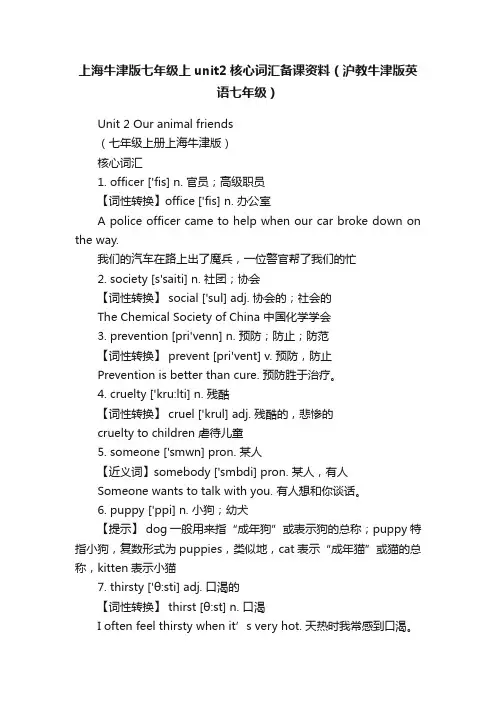
上海牛津版七年级上unit2核心词汇备课资料(沪教牛津版英语七年级)Unit 2 Our animal friends(七年级上册上海牛津版)核心词汇1. officer ['fis] n. 官员;高级职员【词性转换】office ['fis] n. 办公室A police officer came to help when our car broke down on the way.我们的汽车在路上出了魔兵,一位警官帮了我们的忙2. society [s'saiti] n. 社团;协会【词性转换】 social ['sul] adj. 协会的;社会的The Chemical Society of China 中国化学学会3. prevention [pri'venn] n. 预防;防止;防范【词性转换】 prevent [pri'vent] v. 预防,防止Prevention is better than cure. 预防胜于治疗。
4. cruelty ['kru:lti] n. 残酷【词性转换】 cruel ['krul] adj. 残酷的,悲惨的cruelty to children 虐待儿童5. someone ['smwn] pron. 某人【近义词】somebody ['smbdi] pron. 某人,有人Someone wants to talk with you. 有人想和你谈话。
6. puppy ['ppi] n. 小狗;幼犬【提示】 dog一般用来指“成年狗”或表示狗的总称;puppy特指小狗,复数形式为puppies,类似地,cat表示“成年猫”或猫的总称,kitten表示小猫7. thirsty ['θ:sti] adj. 口渴的【词性转换】thirst [θ:st] n. 口渴I often feel thirsty when it’s very hot. 天热时我常感到口渴。
牛津上海英语七年级上册 Unit2Reading (共35张PPT)
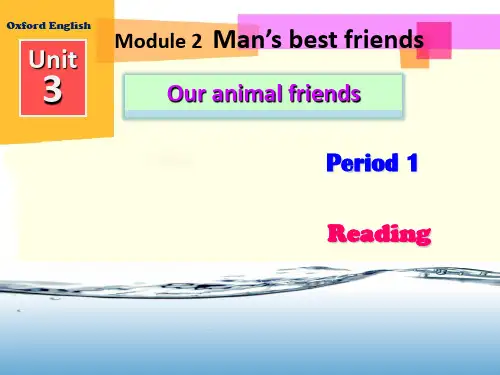
What does a guide dog do? A guide dog helps lead blind people and barks when there is danger.
Task 2
Work in g of the story.
a. At last, they were both safe on the ground. b. John smelt smoke. c. The fireman didn’t want to take Charlie. d. John heard the sound of a fire engine. e. John and Charlie arrived at the hotel. f. John put some wet towels along the bottom of the door. g. The receptionist didn’t allow Charlie into the hotel. h. The receptionist apologized and led them to their room. i. Charlie woke John up. j. John explained that Charlie was his “eyes”. k. John fell asleep.
Speaking
Learn how to say the /bl/, /br/, /fl/, /fr/, /gr/, /kl/, and /kr/ sounds.
Writing
Complete a rescue story.
2018-2019学年沪教牛津版初中英语初一7年级上英语单词(含音标)
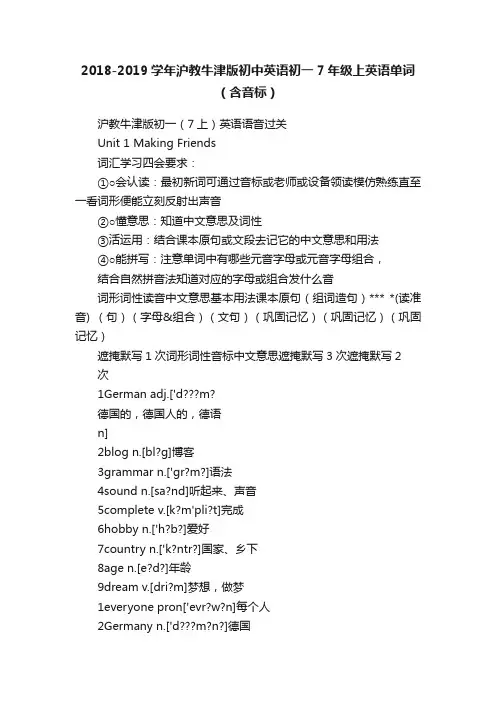
2018-2019学年沪教牛津版初中英语初一7年级上英语单词(含音标)沪教牛津版初一(7上)英语语音过关Unit 1 Making Friends词汇学习四会要求:①○会认读:最初新词可通过音标或老师或设备领读模仿熟练直至一看词形便能立刻反射出声音②○懂意思:知道中文意思及词性③活运用:结合课本原句或文段去记它的中文意思和用法④○能拼写:注意单词中有哪些元音字母或元音字母组合,结合自然拼音法知道对应的字母或组合发什么音词形词性读音中文意思基本用法课本原句(组词造句)*** *(读准音) (句)(字母&组合)(文句)(巩固记忆)(巩固记忆)(巩固记忆)遮掩默写1次词形词性音标中文意思遮掩默写3次遮掩默写2次1German adj.['dm?德国的,德国人的,德语n]2blog n.[bl?ɡ]博客3grammar n.['gr?m?]语法4sound n.[sa?nd]听起来、声音5complete v.[k?m'pli?t]完成6hobby n.['h?b?]爱好7country n.['k?ntr?]国家、乡下8age n.[e?d?]年龄9dream v.[dri?m]梦想,做梦1everyone pron['evr?w?n]每个人2Germany n.['dm?n?]德国3mountain n.['ma?nt?n]山脉4elder adj. ['eld?]年龄较大的,年长的5friendly['fren(d)l?]友好的6engineer n.[end??'n??]工程师7world n.[w??ld]世界8Japan n.[d??'p?n]日本9flat adj. [fl?t]平房,平坦的0yourself pron[j??'self]你自己1US n.美国close to 靠近 go to school 去上学 be good at擅长make friends with 和。
牛津上海版七年级英语上册Unit2知识点讲义
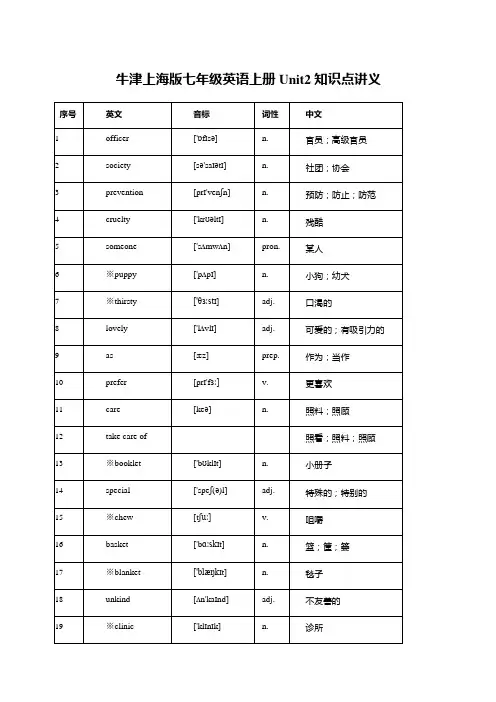
牛津上海版七年级英语上册Unit2知识点讲义知识点梳理I. Useful words and expressions1. I’m an SPCA officer.➢注意:SPCA中的“S”/es/的发音以元音开头,所以要用冠词an. 类似的字母发音以元音开头还有:F、H、L、M、N、S、X。
2. That’s right.➢注意区别:That’s right, That’s all right, All rightAll right=OK 好的;好吧That's all right意为“没关系,不客气”,用于Sorry或Thank you的回答。
That's right意为“那没错”, 表示某人的观点正确。
3. They had no food or water.➢no=not any 本句可改写为:They didn’t have any food or water.➢肯定句中连词应用and[e.g.] The students sang and danced in the park yesterday.否定句中连接并列成分应用or[e.g.]There isn’t any air or water on the moon.4. I found them and took them to the SPCA.➢take sb. / sth. to some place 把……带去(某地)bring sb. / sth. to some place 把……带来(某地)5. Would you like to keep one as your pet?➢Keep…as…:饲养…当作➢one(s) 用来代替前面出现过的单数(复数)的人或物;[e.g.] I’m looking for a cat. Do you see one?The books on this desk are newer than the ones on that desk.6. I prefer the black one.➢prefer最常见的意思是"比较喜欢"、"更喜欢"等, 可以构成以下结构:1) prefer sth/doing sth.. [e.g.] I prefer watching TV.2) prefer to do sth. [ e.g.] I prefer to go at once.3) prefer sth. /doing sth. to sth. / doing sth. = like…better than…[e.g.] I prefer coffee to tea.Mr. Wang preferred reading to doing nothing.7. How to take care of your new puppy?➢take care of + n. /pron.(代词用宾格)➢take care of = look after =care for➢好好照顾,悉心照顾take good care of = look after well8. Feed him/her 1-2 times every day.➢every day 时间副词; 每天[e.g.] I leave home for school at 7 o’clock every day.everyday = daily形容词;每天的,日常的。
第三课时:Unit 2 Section 2 Grammar课件 沪教牛津2024版(广州,深圳)七上
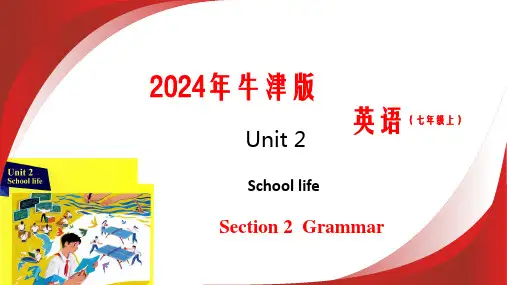
(行为动词)一般现在时的各种句式: 1 肯定句:主语+动词原形(或-s/-es)+ …… 如:
We go to school by bike every day. 我们每天骑自行车上学。 Mary swims very well. 玛丽游泳游得很好。 2 否定句:主语+do not/does not(或don’t/doesn’t)+动词原形+…如: I don’t have a pen. 我没有钢笔。 She doesn’t like music. 她不喜欢音乐。
2 Play q guessing game in pairs. One chooses a student from the table and says three or four sentences about him/her. The other guesses who he/she is.
(3) 以辅音字母+y结尾的动词,改y为i再加-es。 study → studies, fly → flies
(4) 特殊变化。 have → has
给出下列动词的第三人称单数
talk_t_a_lk_s_ stop_s_to_p_s_ say_s_a_y_s_ fly_f_l_ie_s_ make_m__a_k_es reciter_e_c_it_e_s drive_d_r_iv_e_s wake_w_a_k_e_s
Look and say in pairs.
Do you like learning maths ? Why Yes, It makes me think carefully when I'm solving difficult problems.
Unit2Section1Reading教学设计2024-2025学年沪教牛津版英语七年级上册
科目
授课时间节次
--年—月—日(星期——)第—节
指导教师
授课班级、授课课时
授课题目
(包括教材及章Leabharlann 名称)Unit 2 Section1 Reading教学设计2024-2025学年沪教牛津版英语七年级上册
-材料2:《Unique Families》
本文讲述了一些特殊家庭的故事,如单亲家庭、领养家庭等。学生可以通过阅读了解这些家庭的特殊性,并学会尊重和理解不同类型的家庭。
-材料3:《The Importance of Family》
本文讨论了家庭对个人成长的重要性,包括家庭成员之间的情感联系和相互支持。学生可以通过阅读认识到家庭在个人生活中的重要作用。
(二)存在主要问题
1.学生自主学习能力不足:在本次教学中,我发现部分学生自主学习能力不足,需要在今后的教学中加强培养。
2.课堂组织管理有待提高:在课堂活动中,我发现课堂组织管理方面存在一些问题,需要进行改进。
3.教学评价方式单一:本次教学中,教学评价方式较为单一,未能全面反映学生的学习效果,需要进行改进。
-讲解知识点:详细讲解家庭成员的英文表达方式,结合实例帮助学生理解。
-组织课堂活动:设计小组讨论,让学生在实践中掌握描述家庭成员的英文表达方式。
-解答疑问:针对学生在学习中产生的疑问,进行及时解答和指导。
学生活动:
-听讲并思考:认真听讲,积极思考老师提出的问题。
-参与课堂活动:积极参与小组讨论,体验家庭成员的英文表达方式的实践应用。
作用与目的:
-巩固学生在课堂上学到的家庭成员的英文表达方式和相关知识。
沪教牛津版广州英语七年级上册Unit2讲义(精品资料).doc
【最新整理,下载后即可编辑】英语初一专题系列之Unit 2 Daily life1. between…and… _________________________2. 把某物送给某人________________________3. once or twice a week_________________________4. on foot_________________________5. 过得愉快_________________________6. 放学后_________________________7. 教某人做某事_________________________ 8. in the middle of _________________________9. 参加_________________________ 10. by doing sth_________________________11. How often _________________________ 12. junior high school _________________________13乘公共汽车_________________________ 14. 在…末尾_________________________15起床_________________________ 16. play the piano_________________________1. Listen to a boy talking about his weekend.【考点聚焦】Talk about意为“___________”,后面既可以接人, 也可以接物。
Let’s talk about the problem.The students are talking about the new teacher.2. 辨析That’s right. All right与That’s all right[考点聚焦]①That’s right ___________。
沪教牛津版七年级上册英语Unit2 课时6 More practice~Culture corner
C. themChineseD. themChina C
八、任务型阅读。
第21页原文。
46. PleasetranslatetheunderlinedsentenceintoChinese. ______________________________________________
25.妈妈每天备课两次。 Mum________her________twiceaday.
prepareslessons
六、短文填空。(有两个词多余)
close, be, with, home, basketball, house, grades, people, four, but, from, brother
他们来自不同的国家,喜欢不同的动物。
【点拨】原句为: Theyarefromdifferentcountriesandlikediff erentanimals.
47. WheredoesHanDancomefrom? ___________________________________________
【点拨】根据原文第二段中句子 LindaisfromAmerica. Herfavouriteanimalisthepenguin.可知答案。
MikeandAnnare________26andsister. brother
Theyliveinalarge________27. Thehhoouusseei迈s_克__和__安__是_2兄8to妹am关o系ucln。otsaein.
Thereare_______fo_u2r9peopleinthefamily:Mike, Ann, theirfatherandtheirmother. Theirfatherisafarmer.
沪教牛津版(2024)七年级英语上册+习题课件+Unit+5+Section2+Grammar+课件
A. Are; will borrow
B. Is; going to borrow
C. Will; borrows
D. Are; going to borrows
2.It will _____ very cold tomorrow.
A. be
B. is
C. going to be
D. are
3.I_____ shopping with my mum next weekend.
随堂练习:单项选择 1.Tom ________ at 10pm.
A. are going to arrive B. will be arrive C. is going to 2.Tina ________ for Shanghai in three days.
A.left B. is left C. is leaving D. leaves 3.—Hellen, where are you?
1.时间类标志词: tomorrow(明天)、the day after tomorrow(后天)、 next week(下周)、next year(明年)
具体时间段:in two weeks(两周后)、in five years(五年后) 未来某个时间段:in the future(在将来)、
some day(将来的某一天)
如:I’m leaving for Shanghai the day after tomorrow. 我后天去上海。
Helen, where are you going? 海伦,你去哪?
一般将来时
(2) 表示交通方式、行程安排的动词,如walk, fly, drive, ride, take (a taxi, a bus)等,现在进行时也表将来。 如:I’m driving to the library in the afternoon. 我下午要开车去图书馆 We are flying to London tomorrow. 我们明天要飞去伦敦。
- 1、下载文档前请自行甄别文档内容的完整性,平台不提供额外的编辑、内容补充、找答案等附加服务。
- 2、"仅部分预览"的文档,不可在线预览部分如存在完整性等问题,可反馈申请退款(可完整预览的文档不适用该条件!)。
- 3、如文档侵犯您的权益,请联系客服反馈,我们会尽快为您处理(人工客服工作时间:9:00-18:30)。
英语初一专题系列之Unit 2 Daily life1. between…and… _________________________2. 把某物送给某人________________________3. once or twice a week_________________________4. on foot _________________________5. 过得愉快_________________________6. 放学后_________________________7. 教某人做某事_________________________ 8. in the middle of_________________________9. 参加_________________________ 10. by doing sth _________________________ 11. How often _________________________ 12. junior high school_________________________13乘公共汽车_________________________ 14. 在…末尾_________________________15起床_________________________ 16. play the piano _________________________1. Listen to a boy talking about his weekend.【考点聚焦】Talk about意为“___________”,后面既可以接人, 也可以接物。
Let’s talk about the problem.The students are talking about the new teacher.2. 辨析That’s right. All right与That’s all right[考点聚焦]①That’s right ___________。
(对别人所说的话表示肯定)②All right___________ ; ___________;___________ 。
③That’s all right ___________; ___________(客气话和道歉的回应)—The book is very interesting.—That’s right.[考点聚焦]①助动词do/does/did后面要跟动词原形;②每周一两次注意:在英语中, 表示一次用once, 两次用twice, 表示三次或者三次以上就用基数词+times(time 在这里是可数名词, 表示次数, 需要加s)如:once a week, twice a week, three(four/ five…)times a weekI play computer games once or twice a week.She (watch)TV (一周两次)1. —Would you please help me do the dishes, John?(2016中考)—___________, but I’m busy cleaning my room.A. You’re welcomeB. I’m sorryC. It doesn’t matterD. That’s right2. —The programme is very popular.—___________ We all like it.A. That’s rightB. Not at allC. It doesn’t matterD. You’re welcome3. Let’s discuss the problem after school.A. talk toB. talk aboutC. know aboutD. think about4. 他一周上一两次网。
He surfs the Internet _________________________________a week.5. I go swimming twice a week. (对划线部分提问)_________________________________ do you go swimming?4. how often do you watch television.[考点聚焦]①how often 多久一次, 询问动作发生的频率(上节学过的特殊疑问句, 现在再来复习)—___________(一周四次)②watch television= watch TV 看电视[辨析]watch、look、see、read①Different:不同的。
反义词:___________Be different from ““②enjoy doing sth= like/love doing sth___________enjoy oneself相当于___________和___________③___________:获悉;了解1. My father goes to work on foot every day.My father ______________________every day.2. —Could you tell me it takes to walk to the Disneyland?(2016中考)—About 20 minutes.A. how farB. how longC. how oftenD. how soon3. at this picture. can you the cat under the table?A. Look;lookB. See;lookC. Look;seeD. See;look at4. 同义句改写Do you enjoy yourselves at the party?Do you ______________________at the party?Do you ______________________at the party?5. The accident happened ___________7p. m___________ 9p. m. (2012呼和浩特中考)A. from;toB. between;toC. from;andD. between;andBreak n. 可数名词休息。
have /take a break=have /take a restV. 动词。
打破, 打碎。
Break the window[考点聚焦]①when在这里不是表示询问时间, 而是一个连词, 表示”当···时候”, 后面加一个句子。
此处连接两个先后发生的动作;也可表示两个动作同时发生。
②ring 是不及物动词, “打”n. , 环形物(戒指)。
如:give sb. a ring A magic ring10. How Short it is. 这是一个由how引起的感叹句【高频考点】概念:用来表达喜、怒、哀、乐等强烈情感的句子是感叹句, 句末用感叹号, 一般用感叹词how或what引导句型为:(1)how+形容词/副词+主语+谓语(有时也可以省掉主谓语)这个公园多漂亮啊!______________________(2)What+a/an +形容词+单数可数名词+主语+谓语!What a kind man he is!Tom是多么诚实的一位男孩啊!______________________(3)What+形容词+不可数名词/复数名词+主语+谓语!What fine weather it is today!What beautiful flowers these are!他们是多么聪明的学生啊!______________________[考点聚焦][考点聚焦]exercise意为_________________________________ , 一般用语, 可指训练, 锻炼, 操练等①作可数名词用, “练习, 习题, 体操, 功课, 操练”等, 常用复数。
I'm doing my exercises.②作不可数名词用, “锻炼, 运动”。
Take more exercise, and you will be healthy③作动词用, “训练, 锻炼”。
You must exercise yourself in order to be stronger and healthier.1. ___________ I got home, my sister was doing her homework.A. WhenB. BecauseC. IfD. Thought2. — ___________funny the joke is! It makes us laugh over and over.A. What anB. WhatC. How anD. How3. — ___________exciting boat race it was! Many people watched it. (2016)A. What aB. What anC. HowD. How a4. He didn’t___________ the singing competition because there was something wrong with his throat.A. joinB. attendC. take part inD. participate5. —I’ll go to Japan for a trip next month.—Great! ___________A. Thank youB. Have a good time!C. Best wishes!D. Glad to see you again6. His grade in the exam put him the top students in his class.A. betweenB. amongC. overD. above7. —Hi, guys. Where were we yesterday?—We learned the differences fact and opinion.A. betweenB. amongC. duringD. beyond8. The students do morning___________(exercise)every day.9. My grandmother___________(exercise)three times a week.[考点聚焦]频度副词这里的never是频度副词, 意为”___________ “, 一般用来加强否定语气, 通常用于be 动词、助动词、或情态动词之后, 实义动词之前。
